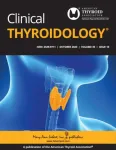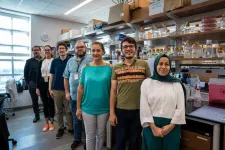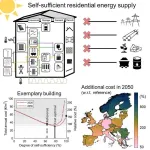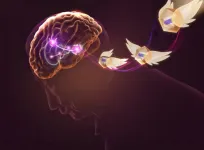(Press-News.org) Climate change is impeding the human rights of a large group of people living in the Pacific, a recent report in Nature reveals.
The paper substantiates a submission to the International Court of Justice (ICJ) on the legal responsibility of countries to act on climate change.
Evidence gathered in Vanuatu supports a clarification on loss and damage finance which could activate powerful legal tools to hold polluters accountable.
Research Fellow at the Griffith University Climate Action Beacon, Dr Ross Westoby said the report explores how climate-induced loss and damage in the Pacific is already occurring and outlines what can be done in response.
“Our findings show loss and damage to fundamental human rights is already occurring, will worsen, and undermine the right to a life of dignity,” Dr Westoby said.
“Bringing a human rights lens to climate change is new and seeks to shift the focus and attention onto the individual experiences of those suffering its impacts.
“If we don’t share the burden of mitigation and adaptation, we must share responsibility for violating someone’s human rights.
“At the national level, human rights impact assessments can inform national and sectoral policy planning and budgeting, ensuring climate policies align with affected peoples’ needs and rights and that effective redress is established with transparency and accountability.
“The detailed findings on the nature of and the experiences of loss and damage should inform climate policy, guiding international and national activities on what should be funded and targeted for effective redress and adaptation.”
Researchers found the most severe loss and damage now undermining the rights of Ni-Vanuatu are related to the right to a healthy environment and the ability to own, use, develop and control lands.
Climate change also effects rights to property, communal assets, standard of living, and family and social cohesion.
Examples of climate-induced loss include:
Loss of traditional medicines that impact people’s identity, health, human life, and well-being
Loss of infrastructure and precious cultural heritage such as gravesites due to flooding of low-lying areas, which also causes salinisation of freshwater tables and impinges on potable water
Reef degradation, increased coral bleaching and outbreaks of crown-of-thorns starfish are a result of increased ocean temperatures and ocean acidification, which cascades into diminishing fishing resources and marine wildlife losses
Loss of identity and loss of traditional and cultural food sources is a result of the cascading effects of climate change affecting people’s diet, and human health
“An example and symbol of the cascading effects of climate change on human rights is the destruction of the yam,” Dr Westoby said.
“The yam is a traditional root crop and staple food widely used in Vanuatu and elsewhere in the Pacific Islands region and is the primary commodity of value for exchange.
“Rituals, rites, and customs of the yam are the main social fabric that binds kinship groups, tribes, communities, and society.”
Recommended approaches for addressing climate change impacts on human rights with the active participation of those most affected include:
Investment in education to improve recovery capacity and resilience and empower people to act and understand their rights
Recording and safeguarding Indigenous knowledge for future generations
Promoting cultural continuation to ensure the transmission of meanings, values, and historical traditions through generations
Building resilience through post-disaster planning to restore infrastructure and societal systems
Preservation of socio-ecological systems which underpin culture, community, well-being, and identity
Using a human rights lens to understand and address loss and damage has been published in Nature Springer journal.
The article authors include Karen E. McNamara, Rachel Clissold, Ross Westoby, Stephanie Stephens, George Koran, Willy Missack and Christopher Y. Bartlett.
END
Climate-induced loss is impeding human rights in the Pacific
Climate change is impeding the human rights of a large group of people living in the Pacific, and findings substantiate a submission to the International Court of Justice (ICJ) on the legal responsibility of countries to act on climate change.
2023-11-02
ELSE PRESS RELEASES FROM THIS DATE:
Bartering light for light: scientists discover new system to control the chaotic behavior of light
2023-11-02
NEW YORK, November 2, 2023 — Harnessing and controlling light is vital for the development of technology, including energy harvesting, computation, communications, and biomedical sensing. Yet, in real-world scenarios, complexity in light's behavior poses challenges for its efficient control. Physicist Andrea Alù likens the behavior of light in chaotic systems to the initial break shot in a game of billiards.
“In billiards, tiny variations in the way you launch the cue ball will lead to different patterns of the balls bouncing around the table,” said Alù, Einstein ...
Study links changes in global water cycle to higher temperatures
2023-11-02
It’s a multi-billion dollar question: What will happen to water as temperatures continue to rise? There will be winners and losers with any change that redistributes where, when and how much water is available for humans to drink and use.
To find answers and make informed predictions, scientists look to the past. Reconstructions of past climate change using geologic data have helped to show the far-reaching influence of human activity on temperatures since the Industrial Age. But assembling hydroclimate records for the same timeframe has proved to be much harder.
A study from the Past Global Changes (PAGES) Iso2k project team, ...
Metabolite tells cells whether to repair DNA
2023-11-02
Metabolites called nucleotides are the building blocks of DNA and can impact cancer’s sensitivity or resistance to chemotherapy and radiation in brain cancer.
Findings from researchers at the University of Michigan Health Rogel Cancer Center, published in Cancer Discovery, show how a specific nucleotide metabolite, called GTP, controls responses to radiation and chemotherapy in an unexpected way.
“We learned that if you increase a cell’s GTP levels, it makes it really resistant to ...
American Thyroid Association® names Trevor E. Angell, MD new Editor-in-Chief of Clinical Thyroidology®
2023-11-02
The American Thyroid Association® (ATA®) is pleased to announce that Trevor E. Angell, MD has been selected as the new Editor-in-Chief of the ATA monthly journal Clinical Thyroidology®. Dr. Angell’s term as Editor-in-Chief will begin in January 2024.
Clinical Thyroidology is one of the ATA’s official journals and is published in partnership with Mary Ann Liebert, Inc. This highly valued abstract and commentary publication provides a comprehensive look at clinical thyroid literature. Experts ...
Hollings researchers uncover new targets for breast cancers resistant to standard therapies
2023-11-02
Researchers at MUSC Hollings Cancer Center believe that some drugs already approved by the U.S. Food and Drug Administration or currently in clinical trials could be repurposed for certain breast cancer patients whose cancer has become resistant to standard therapies.
Ozgur Sahin, Ph.D., a professor and SmartState Endowed Chair in the Department of Biochemistry and Molecular Biology, led the research, which was published Nov. 2 in Nature Communications.
The research, funded by an American Cancer Society Research Scholar Grant, started as an investigation into cancer resistance to the drug tamoxifen but expanded as the research questions led down new ...
Start-up dedicated to developing new antibiotics
2023-11-02
It all began with basic research: While conducting laboratory experiments, a team at the Technical University of Munich (TUM) came across an active agent against multidrug-resistant bacteria with a fundamental difference to antibiotics developed to date. The researchers have since established a start-up to develop a new drug based on this agent. The entrepreneurs have now been nominated for Science Breakthrough of the Year in the Science Start-Up category at the international Falling Walls summit.
Rising numbers of bacteria are developing ...
Two million European households could abandon the electrical grid by 2050
2023-11-02
Researchers report that 53% of European freestanding homes could have supplied all their own energy needs in 2020 using only local rooftop solar radiation, and this technical feasibility could increase to 75% in 2050. Publishing November 2 in the journal Joule, the study shows that there is no economic advantage for individual households to be fully self-sufficient under current or future conditions, though in some cases the costs are on par with remaining on-grid. The researchers estimate that self-sufficiency will be economically feasible for 5% (two million) of Europe’s 41 million freestanding single-family homes in 2050, ...
One sleepless night can rapidly reverse depression for several days
2023-11-02
All-nighters can cause giddy and slap-happy feelings
This effect is caused by increased dopamine release in distributed brain regions
This dopamine signal also enhances plasticity in the neuronal connections, causing a potent antidepressant effect that lasts for days
Study suggests that prefrontal cortex and its dopamine inputs are key for rapid plasticity and antidepressant effects after brief sleep loss
EVANSTON, Ill. — Most people who have pulled an all-nighter are all too familiar with that “tired and wired” ...
Circuit-specific gene therapy brings new hope for treatment of Parkinson’s disease
2023-11-02
Researchers from the Shenzhen Institute of Advanced Technology (SIAT) of the Chinese Academy of Sciences (CAS) and their collaborators have developed a gene therapy strategy to selectively manipulate Parkinson's disease-affected circuitry and attenuate the core motor symptoms of Parkinson's disease in rodent and nonhuman primate animals.
The study was published in Cell on Nov. 2.
Parkinson's disease, characterized by the loss of midbrain dopaminergic neurons, is one of the most common neurodegenerative diseases in the elderly population, affecting more than 6 million people worldwide.
Dopamine ...
Higher risk of breast cancer in women with false positive mammography result
2023-11-02
Women who receive a false positive mammography result are more likely to develop breast cancer over the subsequent 20 years, report researchers from Karolinska Institutet in a study published in JAMA Oncology. The risk is highest for women aged between 60 and 75 and who have low breast density.
In global terms, breast cancer is the most common form of cancer among women, and screening is an important tool for catching women with a tumour at the earliest possible stage. In Sweden, all women between ...
LAST 30 PRESS RELEASES:
How can you rescue a “kidnapped” robot? A new AI system helps the robot regain its sense of location in dynamic, ever-changing environments
Brainwaves of mothers and children synchronize when playing together – even in an acquired language
A holiday to better recovery
Cal Poly’s fifth Climate Solutions Now conference to take place Feb. 23-27
Mask-wearing during COVID-19 linked to reduced air pollution–triggered heart attack risk in Japan
Achieving cross-coupling reactions of fatty amide reduction radicals via iridium-photorelay catalysis and other strategies
Shorter may be sweeter: Study finds 15-second health ads can curb junk food cravings
Family relationships identified in Stone Age graves on Gotland
Effectiveness of exercise to ease osteoarthritis symptoms likely minimal and transient
Cost of copper must rise double to meet basic copper needs
A gel for wounds that won’t heal
Iron, carbon, and the art of toxic cleanup
Organic soil amendments work together to help sandy soils hold water longer, study finds
Hidden carbon in mangrove soils may play a larger role in climate regulation than previously thought
Weight-loss wonder pills prompt scrutiny of key ingredient
Nonprofit leader Diane Dodge to receive 2026 Penn Nursing Renfield Foundation Award for Global Women’s Health
Maternal smoking during pregnancy may be linked to higher blood pressure in children, NIH study finds
New Lund model aims to shorten the path to life-saving cell and gene therapies
Researchers create ultra-stretchable, liquid-repellent materials via laser ablation
Combining AI with OCT shows potential for detecting lipid-rich plaques in coronary arteries
SeaCast revolutionizes Mediterranean Sea forecasting with AI-powered speed and accuracy
JMIR Publications’ JMIR Bioinformatics and Biotechnology invites submissions on Bridging Data, AI, and Innovation to Transform Health
Honey bees navigate more precisely than previously thought
Air pollution may directly contribute to Alzheimer’s disease
Study finds early imaging after pediatric UTIs may do more harm than good
UC San Diego Health joins national research for maternal-fetal care
New biomarker predicts chemotherapy response in triple-negative breast cancer
Treatment algorithms featured in Brain Trauma Foundation’s update of guidelines for care of patients with penetrating traumatic brain injury
Over 40% of musicians experience tinnitus; hearing loss and hyperacusis also significantly elevated
Artificial intelligence predicts colorectal cancer risk in ulcerative colitis patients
[Press-News.org] Climate-induced loss is impeding human rights in the PacificClimate change is impeding the human rights of a large group of people living in the Pacific, and findings substantiate a submission to the International Court of Justice (ICJ) on the legal responsibility of countries to act on climate change.






